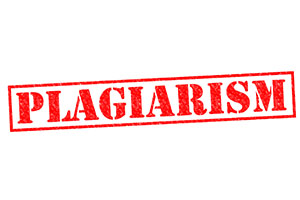Plagiarism and Content Scraping of Website Text
 Have you ever felt like you were just plain out of ideas for what to include in your website’s content? Do you ever just find yourself exploring the Internet to gather ideas, and then find yourself getting really excited about text and content you have stumbled upon? If you are finding a lot of great material online to help you get past your block, that is fantastic! The Internet is a phenomenal place to read, learn, and communicate.
Have you ever felt like you were just plain out of ideas for what to include in your website’s content? Do you ever just find yourself exploring the Internet to gather ideas, and then find yourself getting really excited about text and content you have stumbled upon? If you are finding a lot of great material online to help you get past your block, that is fantastic! The Internet is a phenomenal place to read, learn, and communicate.
However, plagiarism and content scraping are two very real and very serious offenses. Do you remember as a young child in grade school, writing a paper and failing because all you did was copy text word-for-word, rather than just using ideas taken from the content to create your own work?
Well, as an adult,you may not be getting an "F", but you could absolutely end up with a cease & desist letter, a lawsuit, or other ramifications on your hands. This is where we will give you some information about plagiarism, content scraping, and Copyright infringement.
Copyright Infringement and Plagiarism
 Adding information to your site can greatly supplement your search engine optimization, it is very important to provide relevant information and resources for your target audience. Sometimes, it can be tricky, when you see others around you committing Copyright infringement and plagiarism. Perhaps, you come across the most aesthetically pleasing and information-rich site you have ever set your eyes on. Wow, you are just blown away by how the site seems to have an answer to any question that could possibly come up.
Adding information to your site can greatly supplement your search engine optimization, it is very important to provide relevant information and resources for your target audience. Sometimes, it can be tricky, when you see others around you committing Copyright infringement and plagiarism. Perhaps, you come across the most aesthetically pleasing and information-rich site you have ever set your eyes on. Wow, you are just blown away by how the site seems to have an answer to any question that could possibly come up.
However, if it is plagiarized, if it is stolen content you can be sure that the visual appeal will not be enough to get off the hook for stealing content when the content thief gets caught. The Internet itself isn’t really "owned" by anyone, which makes it public domain, but the contents on the Internet were all created by people. Once an individual creates a work, it is copyrighted. There is a common misconception that if there is not a © symbol, the work is not copyrighted. We are here to let you know, that is false. If you write a book right now, that is your work, no? What if you tuck the book away and someone stumbles upon it, snatches it, and decides to publish it as their own work? That is not a gratifying feeling. You are the one who put so very much time, energy, and creativity into that wonderful book! It is the same thing with content on the Internet.
Benefiting from someone's efforts is just plain wrong. Not to mention, what if the content stolen is written by someone who is making their living off of writing? You wouldn’t appreciate if someone decided they wanted your products or services without compensation, would you?
PLAGIARIZING

Plagiarized is Copying Content
The most obvious form of plagiarizing is copying content verbatim, or copy and pasting. It is much easier to do that, but it’s not worth, and it’s not original. This can take a hit on your search engine optimization as well. The reason for this is that if there are multiple results coming up with the same exact content, numerous different sites can appear in the search. This could absolutely put your site on the third, the fourth, the fifth page.
We, at Fencl Web Design, want you to have optimal search engine result for your site. But, we want to make sure it is not in a way that will be violating Copyright laws. Copyright infringement is any act of violating the copyright owner’s exclusive rights to the content. They were granted these rights by the federal Copyright Act. There are also certain situations where a content owner may not want their content featured on a certain site. Some of the reasons include, but are not limited to: the site being visually unappealing, a clash of morals, an excessive amount of ads or popups, the site wanting to use the content could have a bad reputation, or the owner of the site might not be someone the content owner would get along with.
 If you are caught plagiarizing, stealing text, or stealing content; there are a lot of different legal penalties you could be faced with. You may be required to pay the actual dollar amount for the damages and profit. We don’t know very many people in the world who want to spend their hard-earned money paying $200-$150,000 for each work they may be guilty of infringing! You would very likely get smacked with outrageous lawyer fees and court costs on top of it.
If you are caught plagiarizing, stealing text, or stealing content; there are a lot of different legal penalties you could be faced with. You may be required to pay the actual dollar amount for the damages and profit. We don’t know very many people in the world who want to spend their hard-earned money paying $200-$150,000 for each work they may be guilty of infringing! You would very likely get smacked with outrageous lawyer fees and court costs on top of it.
The Court can issue an injunction to stop the infringing acts, and can also impound the illegal works. There is also a possibility that you could be looking at jail time. As a business owner or anyone who is promoting their goods or services to the public, serving time in jail can have some seriously negative aftermath for you. Think about the reputation you have among your clients, customer, patients, potentials, etc. How about other businesses that you would maybe want to eventually work with? Jail also costs quite a bit of money, money you could be using to promote yourself, your business, or your product. The time you spend in jail is wasted time. It is time that you could have spent doing a plethora of things.
Is Copying Content Really Easier?
Before you decide that it would be easier just to copy and paste that article or blog post, think about the pro’s and con’s. There are no pro’s. Original content is the best way to go if you want to really personalize your site. What could be better than knowing your unique content will boost your search engine results, give everyone a clear idea of what it is you have to offer, and give you the peace of mind that your site is not going to put you in a legal bind? We hope this article has given you some insight into the risks of plagiarism and stolen content.





